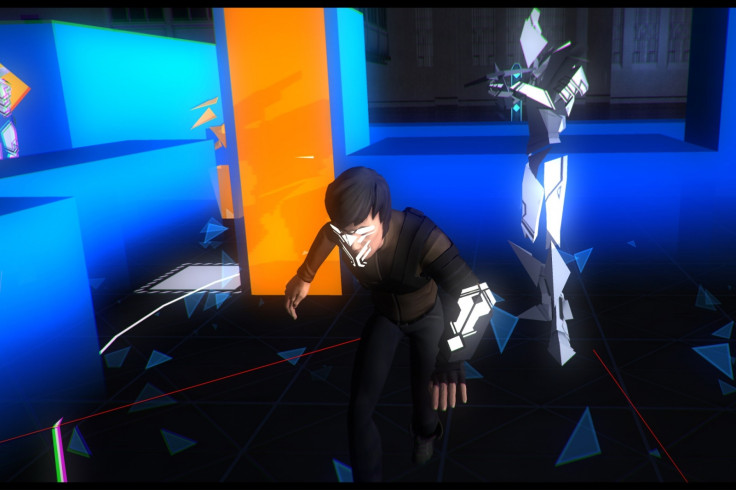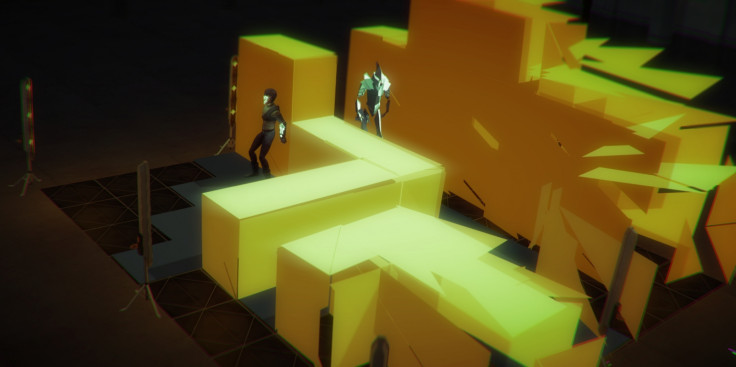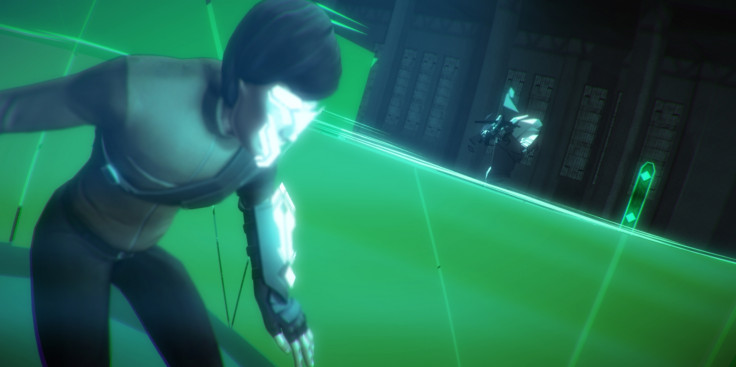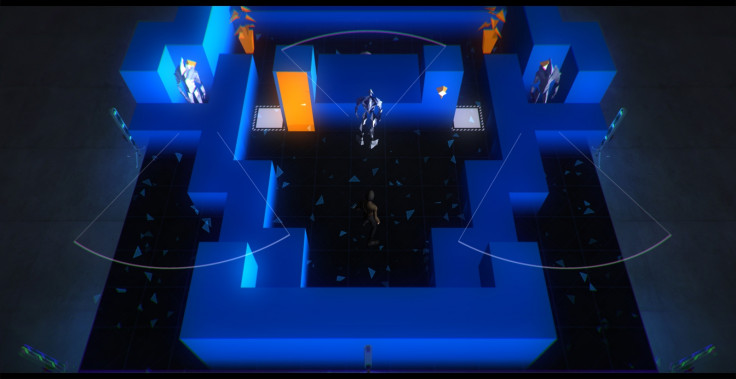EGX 2014 Volume Interview: Mike Bithell On Stealth, Thomas Was Alone Success and Being Bought Out

Following quaint indie hit Thomas Was Alone, Mike Bithell has become well-known in the British gaming community. His latest game isn't another platforming title like Thomas, though, but a stealth one by the name of Volume.
A futuristic retelling of the Robin Hood legend, Volume takes the genre made famous by Metal Gear Solid and Splinter Cell, and strips it down to its most basic principles.
Released in 2015, Volume is prepped to build on everything Thomas Was Alone achieved while targeting a whole new audience thanks to a deal from Sony that will see it come to the PlayStation 4 and PS Vita, and which saw Bithell take to the stage at Sony's Gamescom press conference last month.
At EGX 2014 in London, IBTimes UK spoke to Bithell about Volume, fame and the perils of success...
What is Volume?
It is a stealth game that I've been designing since I was about 15. It's the game I've been wanting to make for years and thanks to Thomas Was Alone, I had the resources to do it.
Thomas Was Alone stripped back the platforming genre visually and mechanically, and now Volume does so with stealth. Where does that desire to boil down these genres to their core elements come from?
I think that's just how I work as a video game designer; that's the stuff that interests me, those underlying rule sets in these games. It intrigues me and I want to play with those, so really this is just a continuation, playing with this idea of what is a stealth game and what can pull out of that game design to get to that pure nub of game design.
There's also stuff we're trying to do that actively tweaks the way stealth games work, so it's faster paced than most stealth games with lots of stuff in there to coax you into moving through the game faster. It's an instinct for me to try and take games and simplify them down to their core.

What's it been like working with a bigger cast this time around?
The cast this time is much bigger but the focus is this relationship between two characters, Loxley (Charlie McDonnell) and the AI (Danny Wallace). We spent a day rehearsing in this theatre studio we hired in London and rehearsed like we were rehearsing a play. Then the following day we went into the voice-over studio and the two of them recorded with each other. It was really nice, like doing a little play.
Was there ever a temptation to do a Thomas Was Alone sequel? There must have been pressure...
Lots of my friends suggested it, saying I should cash in and make some money. It would have done well and it would have made money and it would have been cheap to make but I didn't see the point. I've been given the opportunity to spend a long time making whatever games I want, so I'm not going to rush into doing some half-formed sequel.
There are certainly things that lend themselves more nicely to being franchises – Volume is a game that can work in a franchise I think, it could be the start of a series if I wanted it to be, but Thomas Was Alone was never really designed to be that. I said everything I wanted to say.
Your projects are naturally getting bigger and more ambitious but you still retain simple charm. Will you always want to keep that, or is developing more complex games naturally where your career will go?
I think if you look at the complexity between just Thomas Was Alone and Volume, it's a big jump up. I suspect that will continue. I think I have a certain aesthetic and game design taste, and that taste is minimal, but that said with every game I release, I want people to be surprised and not understand why I'm doing what I'm doing next.
When I announced Volume, I loved how many of the comments were like: "But that guy makes platformers, why is he making a stealth game?" and I love that. I really want to keep surprising people. I want people to see the third game and wonder why I'm doing that, and the same with the fourth game. I don't want to get caught in one genre because really that bores me.

Do you ever see yourself making a big-budget blockbuster game?
I used to work on them, actually, but I was never in charge. I've been the grunt in the machine on a couple of AAA titles and it's nice to make games that are... y'know... in shop windows, really big games. But I don't like that because of how big the teams are and the influence of any one individual is diminished in a way I didn't really enjoy. I didn't feel like I was having as much input as I wanted, and that's pure ego, that's just wanting to show off. I think I'll always stay reasonably small.
How does your increased fame in the industry effect you, if at all? Appearing at Sony's press conference at Gamescom must have been a huge moment.
Yeah, that was cool; it felt like arriving a bit, like a big break. Everything I do is completely guided by a desire to keep making video games and a realistic understanding that in order to make them, I need to earn money and have a business that works, so really the fame just opens doors. I can get actors I didn't think I'd be able to get; it means I can get meetings with hardware manufacturers, I can talk to companies, I can get access to things and the capacity to make better games. That's all I want, I really just want to keep making cool stuff. And if I am known within a small community then that is useful to me because it facilitates better game-making.
Success brings a level of scrutiny that isn't for everyone. Notch sold Minecraft because of the pressure success brought him and then there's Phil Fish. Does potential big success concern you as an indie developer?

No. I think there are ways of managing it and separating yourself from it. That said, one thing I've learned over the last few years is it's impossible to imagine someone's situation until you've been there. So when I look at people like Notch and Phil, I can't understand what happened because I've not been there. Maybe if I get to their scale of visibility, I'll realise why that's the case. And let's be completely clear here, if Microsoft give me $2.5bn to leave the games industry, I'm going to go to the meeting. That said, success is something intimidating and certainly makes you pause for thought.
The stealth genre has been given more of an action twist over the past ten years and now exists primarily as an alternative to combat. Do you think this is a disservice to a genre as old as platformers?
I don't think it does a disservice but what I think it does is it means stealth has to be rebalanced. If you give the player a gun, you're basically giving them a faster way of winning than hiding. And that's fine, but it means you have to reappraise what abilities you give them to balance that out.
So, for example, you play something like Splinter Cell [Blacklist] with a gun mechanic in that you can tag and then shoot people. That's a cool mechanic and it makes me feel badass but it means every area I walk into has four guards in it that have to be shot. So in removing that capacity to kill in Volume, suddenly that easy option disappears and we can focus our balancing on all the other stuff in stealth games that people don't see because they're too busy just snapping necks.
So, for us, it's about removing the optimal play style – breaking people's necks or shooting them with a silencer – and just leaving the interesting weird quirky stuff that they wouldn't use if the other stuff was there. It's not a value judgment; we're not saying what's better or worse, it's just here's a part of the stealth genre that I don't think anyone has really explored as much as they could.
© Copyright IBTimes 2025. All rights reserved.



















